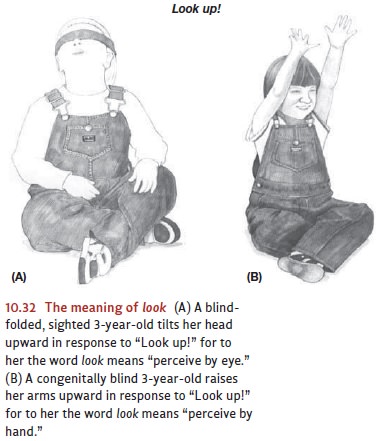Chapter: Psychology: Language
Children Deprived of Access to Some of the Meanings
Children
Deprived of Access to Some of the Meanings
The extraordinarily robust nature
of language development is also apparent when we consider language learning in
the absence of vision. Imagine a child who hears, Look!There’s a big dog! or Do
you see that man playing the guitar? Surely, the child will find iteasier
to grasp the meaning of these phrases if she can observe the dog or the guitar
player, using the perceptual experience to help decode the linguistic input.
This would seem to suggest that language learning would proceed slowly or be distorted
in a blind child cut off from many of the learning opportunities available to
the sighted child. Remarkably, though, the evidence shows that blind children
learn language as rapidly and as well as sighted children. One particularly
striking example is vision-related words like look and see, which blind
children use as early (2 years old) and as systemat-ically as sighted children.
Of course, there are differences in how blind and sighted chil-dren understand
these words. A young sighted listener asked to look up!will tilt her face upward (even if her vision is blocked by
a blindfold). For this child, look
clearly refers to vision (Figure 10.32A).
A congenitally blind child, when given the same command pro-duces a
different—but entirely sensible—response. Keeping her head immobile, she

reaches upward
and searches the
space above her
body with her hands (Figure 10.32B; Landau &
Gleitman, 1985). Thus, each of these children understands look to be an instruction to search a bit of the world by use of
the sense organs.
Not only do these input-deprived
youngsters come to understand terms that refer to sight for those of us with
normal vision, but they also know much about the application of color terms. Perhaps it is not so
surprising that a
blind 5-year-old can respond to
the query Can a cow be green? by saying
I think they are usually brown or white for he might
on some occasion
have heard the
phrase a brown cow uttered by sighted adults, and never a green cow. But to the query Canan idea be green? the blind child
does not wildly guess at some color, but can sensibly answer No, that’s silly; ideas are not any color;
they are only in your head. All this knowledge without any personal
experience of colors at all!
Once again,
we see that
language and even
apparently sight- dependent
concepts emerge in considerable complexity and on schedule despite a dra-
matic shift away
from the standard
circumstances of learning. This provides
further support for the claim that language is a truly basic factor in
human nature. Prepared as the human child is to acquire a language, its
learning can proceed despite significant sensory deprivation.
Related Topics